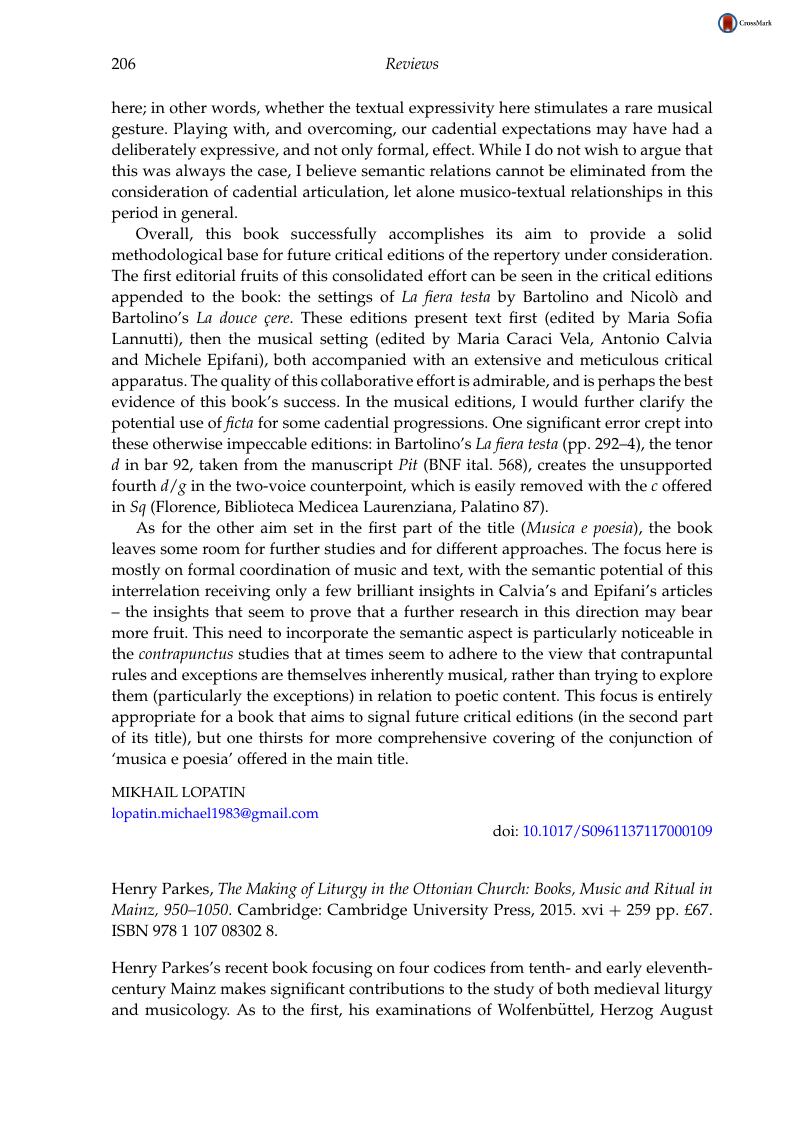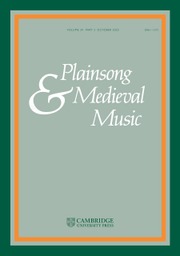No CrossRef data available.
Article contents
Henry Parkes , The Making of Liturgy in the Ottonian Church: Books, Music and Ritual in Mainz, 950–1050. Cambridge: Cambridge University Press, 2015. xvi + 259 pp. £67. ISBN 978 1 107 08302 8.
Published online by Cambridge University Press: 11 October 2017
Abstract

- Type
- Reviews
- Information
- Copyright
- Copyright © Cambridge University Press, 2017
References
1 Although dated, Palazzo, Eric, A History of Liturgical Books from the Beginning to the Thirteenth Century, trans. Beaumont, Madeleine (Collegeville, MN, 1998), 195–207 Google Scholar, summarises the prevailing view concerning the early history of pontificals. See also Vogel, Cyrille, Medieval Liturgy: An Introduction to the Sources, trans. and revised by Storey, William and Rasmussen, Niels (Washington, DC, 1986), 225–47Google Scholar.
2 Haug, Andreas, ‘Handschrift und Geschichte. Vorwiegend Methodisches zum Thema “Mainz in der Musikgeschichte des zehnten Jahrhunderts”’, in Musik der mittelalterlichen Metropole: Räume, Identitäten und Kontexte der Musik in Köln und Mainz, ca. 900–1400, ed. Kolb, Fabian, Musikgeschichte, Beiträge zur rheinischen 179 (Berlin, 2016), 99–123 Google Scholar.
3 McKitterick, Rosamond, ‘Continuity and Innovation in Tenth-Century Ottonian Culture’, in Intellectual Life in the Middle Ages: Essays Presented to Margaret Gibson, ed. Smith, Leslie and Ward, Benedicta (London and Rio Grande, OH, 1992), 15–32 Google Scholar.
4 Les Ordines Romani du haut moyen âge, ed. Michel Andrieu, Spicilegium sacrum Lovaniense 11, 23–4, 28–9, 5 vols. (Leuven, 1931–61), 1: 505–6. One of the editors of the PRG, Cyrille Vogel, dates it to around 950–962 in Medieval Liturgy, 233, 243 (note 235). See also Le pontifical Romano-Germanique du dixième siècle, ed. Cyrille Vogel and Reinhard Elze, Studi e testi 226–7, 269, 3 vols. (Vatican City, 1963–72), 3: 14–19.
5 Andrieu, Michel, Immixtio et consecratio: la consécration par contact dans les documents liturgiques du moyen âge (Paris, 1924), 63 Google Scholar (note 5); idem, Les Ordines Romani 1: 494–545.
6 Andrieu, Les Ordines Romani 1: 500. PRG sources were copied in Germany, Italy, France and England between the late tenth and fourteenth centuries. About half make reference to the province of Mainz; the second most widely disseminated group is connected with Salzburg. See Hamilton, Sarah, The Practice of Penance, 900–1050, Royal Historical Society Studies in History, New series (Woodbridge, Suffolk, and Rochester NY, 2001), 211–13Google Scholar, 220–3 (table 2); Vogel and Elze, Le pontifical Romano-Germanique 3: 11 (note 8), 32–5, 56.
7 Vogel and Elze, Le pontifical Romano-Germanique 1: 202, 208.
8 Andrieu, Les Ordines Romani 5: 83–414; Vogel and Elze, Le pontifical Romano-Germanique 2: 1–141. See also Vogel, Medieval Liturgy, 187–8, 232–3; Parkes, The Making of Liturgy, 93–4.
9 Andrieu, Les Ordines Romani 1: 505–6, however, recognises that the composition of OR L was likely independent of the PRG.
10 For an overview, see Parkes, The Making of Liturgy, 93–100. See also Andrieu, Les Ordines Romani 1: 500–6, 5: 65–8, 72–9; Vogel and Elze, Le pontifical Romano-Germanique 3: 11–19; Vogel, Medieval Liturgy, 232–3; and Palazzo, History, 204–6.
11 Andrieu, Les Ordines Romani 1: 373–88.
12 Parkes, The Making of Liturgy, 94–5.
13 Vogel and Elze, Le pontifical Romano-Germanique 3: 14–28. See also Vogel, Cyrille, ‘Précisions sur la date et l'ordonnance primitive du Pontifical romano-germanique’, Ephemerides liturgicae, 74 (1960), 147–62Google Scholar.
14 Namely Lucca, Biblioteca Capitolare Feliniana, Cod. 607, which Vogel and Elze suggest may date as early as 964 but otherwise indicate 975/1000. Le pontifical Romano-Germanique 3: 19, 32; cf. Andrieu, Les Ordines Romani 1: 156–7. Hamilton, The Practice of Penance, 222, dates the manuscript to the late tenth or early eleventh century, and Roger E. Reynolds to the turn of the eleventh in ‘The Ritual of Clerical Ordination of the Sacramentarium Gelasianum saec. VIII: Early Evidence from Southern Italy’, in Rituels: mélanges offerts à Pierre-Marie Gy, ed. Paul de Clerck and Eric Palazzo (Paris, 1990), 437–45, at 439. See also Palazzo, A History of Liturgical Books, 204 (note 100). Despite being the earliest PRG source, Lucca BC 607 does not preserve what Andrieu and the PRG editors construe as its earliest recension.
15 Vogel and Elze, Le pontifical Romano-Germanique 3: 23–8.
16 Andrieu, Les Ordines Romani 1: 507–25; Vogel and Elze, Le pontifical Romano-Germanique 3: 29, 44–51.
17 Vogel and Elze suggest that a scriptorium may well have existed at the city's metropolitan church in the mid-tenth century, but nonetheless appear to favour St Alban's as the place where the PRG originated. Le pontifical Romano-Germanique 3: 3, 11, 27, 28, 35.
18 Ibid ., 3: 31–35; cf. Andrieu, Les Ordines Romani 1: 495–500.
19 Namely Montecassino, Archivio della Badia, MS 451, and Rome, Biblioteca Vallicelliana, Cod. D. 5. Andrieu, Les Ordines Romani 1: 526–45, 176–211; Vogel and Elze, Le pontifical Romano-Germanique 3: 31–43.
20 Vogel and Elze, Le pontifical Romano-Germanique 3: 29.
21 Ibid., 3: 3; Vogel, Medieval Liturgy, 232.
22 Palazzo, A History of Liturgical Books, 201–3. Even Niels Krogh Rasmussen's study of ninth- and tenth-century collections of episcopal ordines employs the term in Les pontificaux du haut moyen âge: genèse du livre de l’évêque, ed Marcel Haverals, Spicilegium Sacrum Lovaniense, Études et documents 49 (Leuven, 1998), 23, 29. Parkes, The Making of Liturgy, 9, takes issue with the categorisation of these books as ‘prototypes’ or ‘first attempts’.
23 Amalgamated here are passages scattered in Palazzo, A History of Liturgical Books, 201–5.
24 For example, see Vogel, Medieval Liturgy, 225–6.
25 For an overview, see Parkes, Henry, ‘Questioning the Authority of Vogel and Elze's Pontifical romano-germanique ’, in Understanding Medieval Liturgy: Essays in Interpretation, ed. Gittos, Helen and Hamilton, Sarah (Farnham, Surrey, and Burlington, 2016), 75–102 Google Scholar.
26 See the comparative tables in Vogel and Elze, Le pontifical Romano-Germanique 1: [xxxii–lvi]; and Henry Parkes, ‘PRG Database: A Tool for Navigating Le Pontifical Romano-Germanique, ed. Cyrille Vogel & Reinhard Elze’, http://database.prg.mus.cam.ac.uk.
27 Hamilton, Sarah, ‘The Early Pontificals: The Anglo-Saxon Evidence Reconsidered from a Continental Perspective’, in England and the Continent in the Tenth Century: Studies in Honour of Wilhelm Levison (1876–1947), ed. Rollason, David et al. (Turnhout, 2010), 411–38CrossRefGoogle Scholar, at 417–18. See also Pfaff, Richard W., ‘The Anglo-Saxon Bishop and his Book’, Bulletin of the John Rylands University Library of Manchester 81 (1999), 3–24 CrossRefGoogle Scholar.
28 Hoffmann, Hartmut, Buchkunst und Königtum im ottonischen und frühsalischen Reich, Schriften der Monumenta Germaniae Historica 30/1–2, 2 vols. (Stuttgart, 1986), 1: 229–30Google Scholar. Parkes had previously identified twenty-one liturgical manuscripts of Mainz provenance, most of them fragmentary and only two assigned to St Alban's. ‘Liturgy and Music in Ottonian Mainz 950–1025’, Ph.D. diss., University of Cambridge (2011), 22. Both are examined in the book.
29 Hamilton, The Practice of Penance, 219.
30 Hamilton, ‘The Early Pontificals’, 415–16; cf. Palazzo, A History of Liturgical Books, 204–5.
31 Andrieu, Les Ordines Romani 1: 32–464.
32 Rasmussen, Les pontificaux, 477–81. See also Hamilton, ‘The Early Pontificals’, 417.
33 Parkes, The Making of Liturgy, 188–9, 158–9.
34 Parkes, ‘Questioning the Authority’, 97.
35 Parkes, The Making of Liturgy, 9–11.
36 Ibid ., 136–42.
37 Hoffmann, Buchkunst, 1: 266.
38 Andrieu, Les Ordines Romani 5: 358–62; Vogel and Elze, Le pontifical Romano-Germanique 2: 138–40.
39 Parkes, The Making of Liturgy, 129.
40 Ibid ., 33–61; cf. Haug, ‘Handschrift und Geschichte’, 103–6.
41 Hoffmann, Buchkunst, 1: 266–8; Parkes, The Making of Liturgy, 136–40.
42 Parkes, The Making of Liturgy, 146–7. See also Thomas Kozachek, ‘The Repertory of Chant for Dedicating Churches in the Middle Ages: Music, Liturgy, & Ritual’, Ph.D. diss., Harvard University (1995), 27–41; and Louis L. Hamilton, A Sacred City: Consecrating Churches and Reforming Society in Eleventh-Century Italy (Manchester, 2010), 27–38 (table 1).


